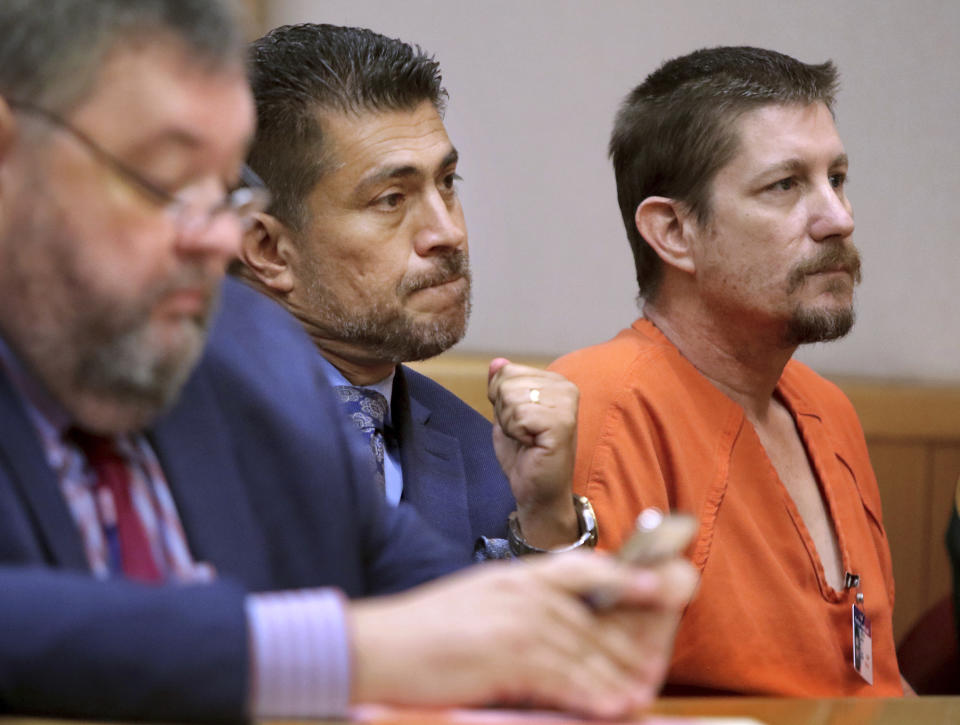Parking lot shooter told detectives he feared severe injury

FORT LAUDERDALE, Fla. (AP) — The Florida man who fatally shot an unarmed black man during a dispute over a handicapped-accessible parking space told detectives he fired because he had been pushed to the ground and feared the man was about to "finish" what he started, video played at his trial Thursday shows.
Prosecutors played Michael Drejka's interview with Pinellas County detectives during his manslaughter trial in Clearwater, Florida. He is charged with the July 2018 death of Markeis McGlockton, 28. Not long after playing the video, the prosecution rested its case after two days of testimony.
Drejka, who is white, shot while on his back from close range seconds after McGlockton shoved him as Drejka argued with McGlockton's girlfriend.
Pinellas County Sheriff's Detective Richard Redman testified that Drejka, 49, willingly spoke to him and Detective George Moffett about five hours after the shooting without an attorney. During the nearly one-hour interview, Drejka complained about pain in his right arm and shoulder, which he injured when he hit the ground. He said his right wrist hurt so badly he had to use two hands to steady his Glock handgun before he fired.
He said going to the convenience store to buy two energy drinks is part of his daily routine. A two-pack-a-day smoker, Drejka told the detectives he retired from his tree trimming job in his thirties because of health issues. He told the detectives he obtained his concealed weapons permit 25 years earlier and "always" carries his gun but said it had been years since he had been to the range to practice.
Drejka told the detectives he has a "pet peeve" about illegal parking in handicapped spots, though he doesn't use one, so he often walks around such cars looking for handicapped stickers and placards, sometimes taking photographs. He said he often sees people illegally parked in the handicapped spot at that convenience store, but the owner doesn't do anything about it. He said he doesn't call the police because the person would be gone before officers arrive.
On July 19, 2018, Drejka pulled into the lot. He told Redman and Moffett he saw McGlockton's car in the handicapped spot, so he went to its back and front, looking for stickers, which store security video confirms. He said the car's windows were tinted, so he didn't know anyone was inside.
He said McGlockton's girlfriend, Britany Jacobs, partially put down her window and asked what he was doing. He said he told her it was "not very polite" to park in the spot and "she took that as an affront." He said that sparked an argument that got heated, with Jacobs saying "Do I have to get my man?" Drejka said he didn't know what she meant, but about that point McGlockton pushed him to the ground.
"I never saw what hit me," Drejka told the detectives.
While lying on his back, Drejka pulled his gun and aimed it at McGlockton. He said he fired when McGlockton moved toward him, "two steps running."
"It happened so fast and that was that," Drejka said. The detectives asked why he fired.
"I have never been in that situation before, but I thought kicks were coming," Drejka said. "I think he is coming to do the rest of it."
Did McGlockton make any verbal threats? No, Drejka said, but he assumed he was about to be further attacked. "Any smart person would."
Toxicologist Bruce Goldberger, the University of Florida medical school's chief of forensic medicine, testified Thursday that McGlockton had a low level of the illegal street drug Ecstasy in his system, but it would not have impaired his judgment and the drug doesn't make users aggressive, but usually more empathetic.
Testifying for the defense, Dr. Daniel Buffington, a University of South Florida toxicologist, disagreed. He said Ecstasy can cause euphoria or emotional instability.
The security video shows McGlockton was backing up when Drejka pulled his gun and fired. Drejka's attorneys argue that is only visible when the video is viewed in slow motion. Drejka told the detectives that if McGlockton was backing up, "I don't need to use my firearm."
Only at the end of the interview did the detectives tell Drejka that McGlockton had died.
"Thank you for telling me that," Drejka said, nodding but showing no further reaction.
Dr. Noel Palma, who performed the autopsy, said the bullet went through McGlockton's heart and lungs, killing him quickly.
Drejka could get 30 years if convicted.
